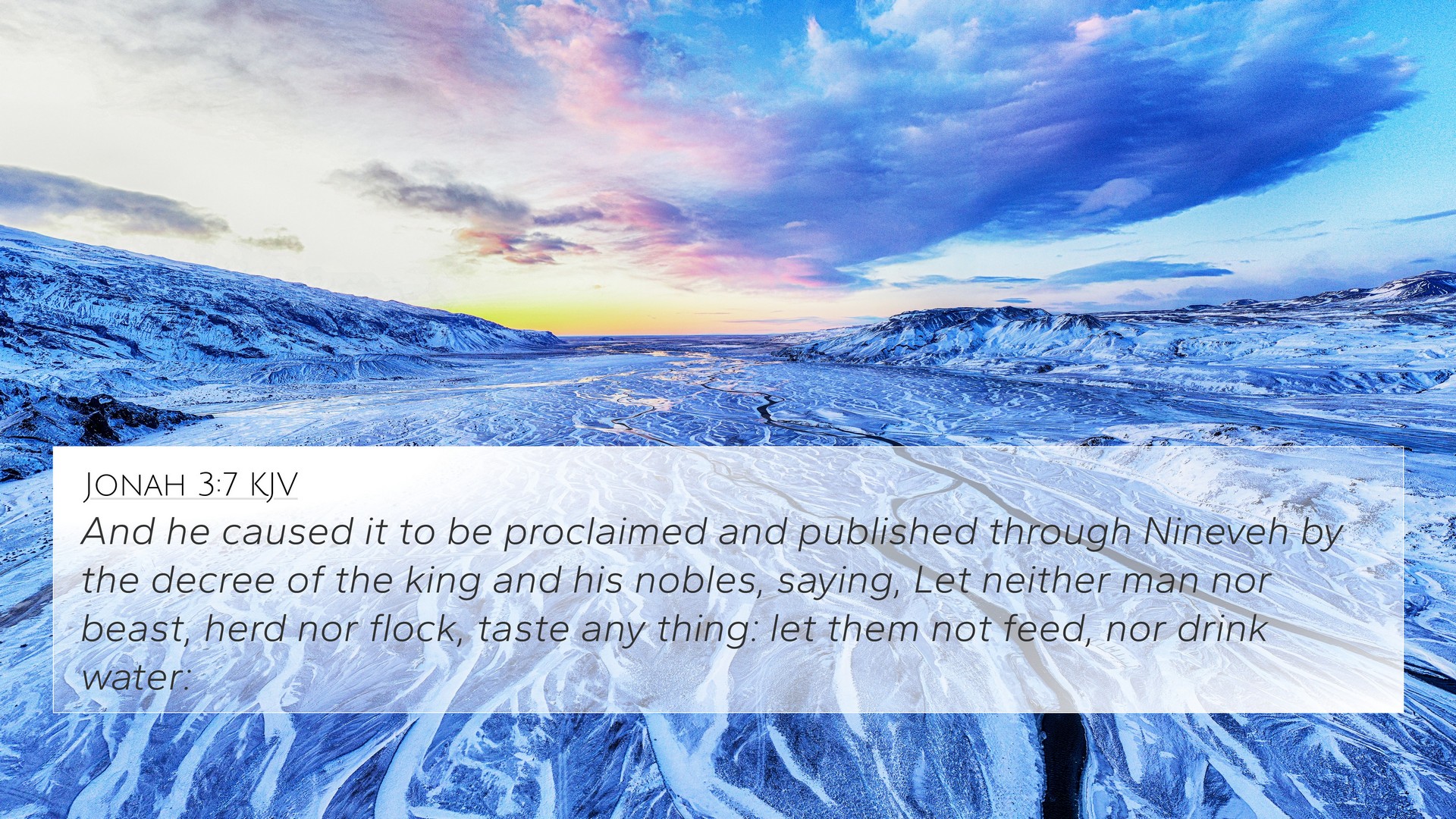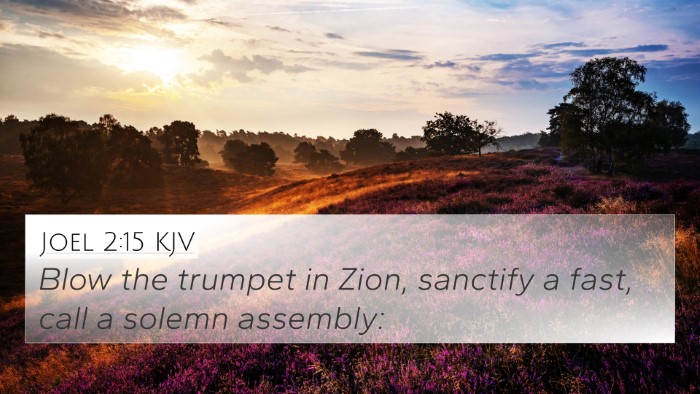Old Testament
Genesis Exodus Leviticus Numbers Deuteronomy Joshua Judges Ruth 1 Samuel 2 Samuel 1 Kings 2 Kings 1 Chronicles 2 Chronicles Ezra Nehemiah Esther Job Psalms Proverbs Ecclesiastes Song of Solomon Isaiah Jeremiah Lamentations Ezekiel Daniel Hosea Joel Amos Obadiah Jonah Micah Nahum Habakkuk Zephaniah Haggai Zechariah MalachiJonah 3:7 Similar Verses
Jonah 3:7 Cross References
And he caused it to be proclaimed and published through Nineveh by the decree of the king and his nobles, saying, Let neither man nor beast, herd nor flock, taste any thing: let them not feed, nor drink water:
Uncover the Rich Themes and Topics of This Bible Verse
Listed below are the Bible themes associated with Jonah 3:7. We invite you to explore each theme to gain deeper insights into the Scriptures.
Jonah 3:7 Cross Reference Verses
This section features a detailed cross-reference designed to enrich your understanding of the Scriptures. Below, you will find carefully selected verses that echo the themes and teachings related to Jonah 3:7 KJV. Click on any image to explore detailed analyses of related Bible verses and uncover deeper theological insights.
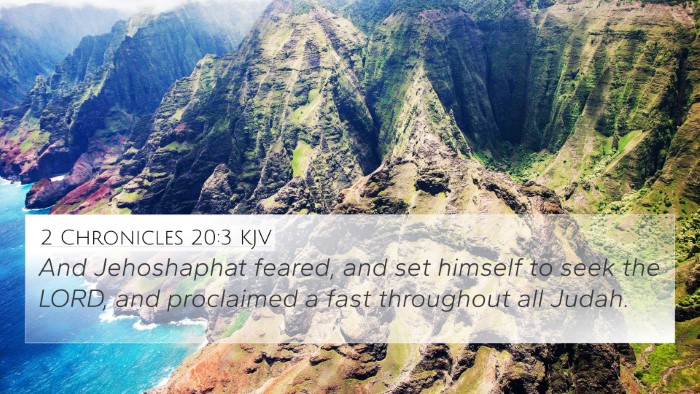
2 Chronicles 20:3 (KJV) »
And Jehoshaphat feared, and set himself to seek the LORD, and proclaimed a fast throughout all Judah.
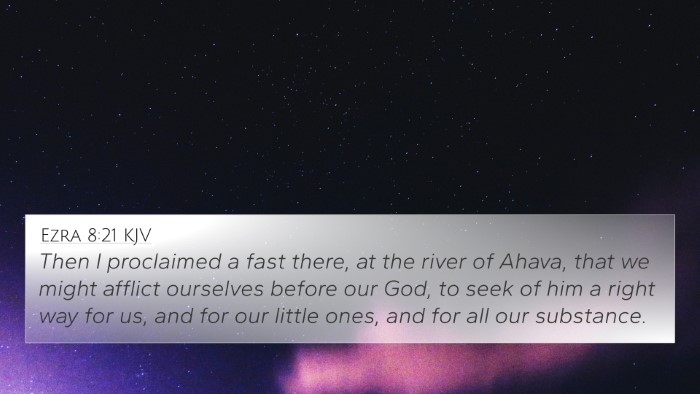
Ezra 8:21 (KJV) »
Then I proclaimed a fast there, at the river of Ahava, that we might afflict ourselves before our God, to seek of him a right way for us, and for our little ones, and for all our substance.
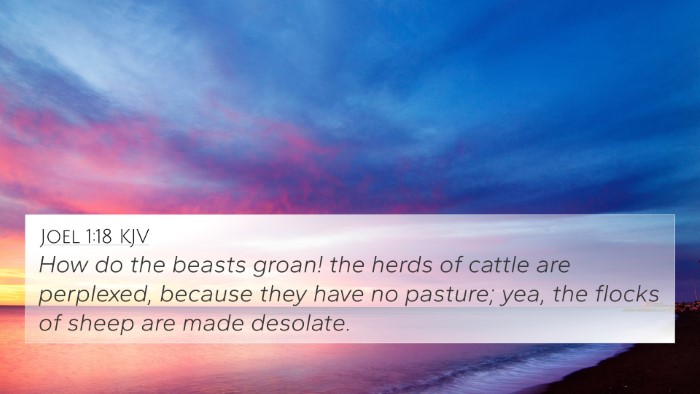
Joel 1:18 (KJV) »
How do the beasts groan! the herds of cattle are perplexed, because they have no pasture; yea, the flocks of sheep are made desolate.

Jonah 3:5 (KJV) »
So the people of Nineveh believed God, and proclaimed a fast, and put on sackcloth, from the greatest of them even to the least of them.
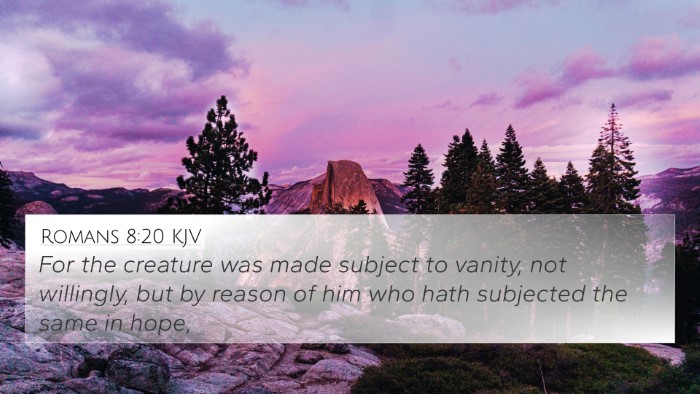
Romans 8:20 (KJV) »
For the creature was made subject to vanity, not willingly, but by reason of him who hath subjected the same in hope,
Jonah 3:7 Verse Analysis and Similar Verses
Understanding Jonah 3:7
In Jonah 3:7, the king of Nineveh issues a decree that emphasizes the importance of repentance and humility before God in light of the impending judgment upon the city. This verse is a pivotal moment in the narrative, revealing the collective response of a powerful city to a divine message through the prophet Jonah. Here, we explore the meanings derived from historical and theological commentaries for a deeper understanding.
Summary of Commentary Insights
- Matthew Henry: Henry emphasizes the king’s swift action and the declaration of a fast as critical responses to God’s warning. The emphasis is on repentance, showcasing how even the most powerful can submit to God’s will. He highlights that “the decree was a reflection of the king's understanding of the seriousness of their situation.”
- Albert Barnes: Barnes notes the significance of the decree, illustrating the king’s role as a representative of the people. He explains how the call to fast and wear sackcloth was an outward symbol of inner penitence, connecting this act back to scriptures that underline communal repentance (like Joel 1:14).
- Adam Clarke: Clarke examines the societal implications of the king's declaration, suggesting that such a call to repentance involved the entire population, including animals. He draws a parallel to how widespread repentance is more powerful in God’s eyes and encourages reflection on the mercy of God, demonstrating that in true repentance, no one is too far gone to return to God.
Bible Verse Cross-References
- Joel 2:12-13 - A call to return to God with all your heart, expressing the need for genuine repentance.
- Matthew 12:41 - Jesus references Nineveh and their repentance in the context of His ministry, indicating the importance of repentance.
- Luke 11:32 - Similar to Matthew, it reiterates that the people of Nineveh will stand in judgment against those who do not repent.
- 2 Chronicles 7:14 - God's call for His people to humble themselves, pray, and seek His face to receive healing.
- Isaiah 58:5 - God's expectation of true fasting and humility as it relates to repentance and His will.
- Jonah 1:1-2 - The commission of Jonah to proclaim God’s warning to Nineveh; setting the stage for the need of this decree.
- Lamentations 3:40 - A call for self-examination and return to God as a way of repentance.
Thematic Connections
This verse fits into several broader themes that can be explored through comparative Bible verse analysis:
- Thematic Bible verse connections: Repentance is a recurring theme in scripture, linking Jonah’s story to the teachings of Jesus about the necessity of turning back to God.
- Cross-referencing Biblical texts: The actions of the Ninevites offer a paradigm for understanding humility and the need for societal repentance, linking Old Testament prophecies with New Testament fulfillment.
- Cultural Significance: The act of wearing sackcloth was a cultural expression of mourning and humility—exploring its relevance in various texts deepens our understanding.
Applications and Reflections
This verse not only tells the story of Nineveh's response to Jonah's warning but also invites readers to reflect on their own responses to divine warnings. In applying these insights, consider:
- How do you respond when faced with difficult truths in your life?
- What practical steps can be taken to embody the humility and submission exemplified by the king of Nineveh?
- In what ways can communal repentance be encouraged in modern contexts?
Conclusion
Jonah 3:7 challenges readers to consider the power of swift and sincere repentance in the face of divine judgment. The connections established through cross-referencing Biblical texts not only enhance our understanding of this verse but also bridge messages across the entire canon of scripture, enriching our study and spiritual growth.
